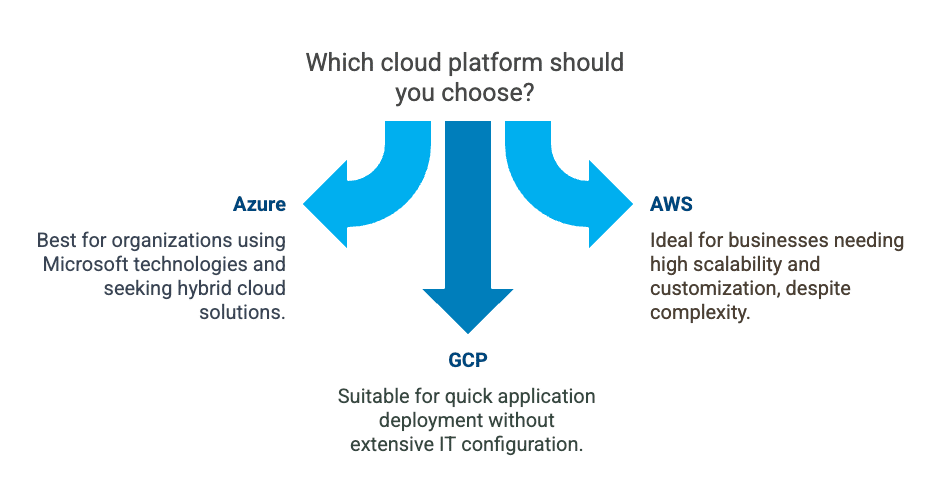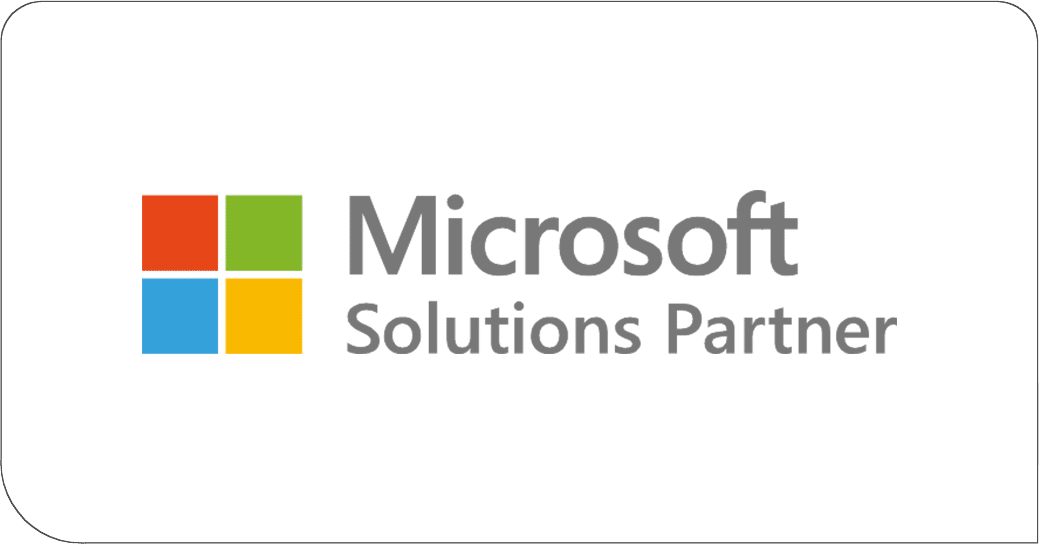Cloud technology solutions have long been established as the tools that organizations should want in their information technology (IT) infrastructure. With the various business benefits that come from the cloud, all companies should be setting their sights on the major players in the cloud computing space—Google Cloud Platform (GCP), Amazon Web Services (AWS), and Microsoft Azure (Azure)—to see which platform will benefit their business processes the most.
However, with all their configurations and abilities, it can be difficult to see which platform would offer your organization the most value. This simple article will provide you with all the information you need to differentiate between the main cloud computing platforms to help you choose the best one for your business.
What is cloud computing?
Cloud computing supplies users with the ability to use, store, manage, and edit data within a specific platform that is accessed through the Internet. This technology has been embraced by organizations around the world due to its benefits, including increased scalability and cost-efficiency. Furthermore, cloud computing allows businesses to store their programs at external locations, giving employees the flexibility to leverage company data and resources from any location.
Cloud computing services are typically offered as: Infrastructure-as-a-service (IaaS), software-as-a-service (SaaS), and platform-as-a-service (PaaS). At the same time, cloud models can be created in the following forms:
- Public clouds
- Hybrid clouds
- Private clouds
- Multi-clouds
With the cloud powering your business IT solutions, you will be able to improve your business efficiency and competitive edge with technologies that promote increased information security and hassle-free collaboration.
AWS vs Azure vs Google Cloud Platform: A look at each solution

In a market that “was valued at USD 483.98 billion in 2022”, with it sure to increase as time goes on, it is essential for organizations to have an idea of the differences between Azure, GCP, and AWS.
This knowledge can help you make stronger decisions regarding your company’s cloud technology solutions, ensuring that you do not waste resources on cloud-based business IT solutions that may not be relevant for you or your team members.
An overview of Azure
Azure is Microsoft’s cloud computing solution. It offers a range of cloud services, including those for machine learning, analytics, and storage. With Azure, organizations of any size can take full advantage of hybrid cloud solutions to make data stored in the cloud, and onsite, accessible and usable. Azure’s versatility allows businesses that do not use Windows to still access the platform.
Companies that run on Microsoft technologies can use Azure to leverage cloud technology solutions and environments that promote seamless information flows and migrations. Azure is recommended for organizations that are interested in adopting Microsoft’s business IT solutions, businesses that already use Microsoft tools, and companies that want an extensive range of cloud services.
An overview of AWS
AWS is Amazon’s cloud computing solution. Available at different prices, business owners that are looking for an IaaS solution to their cloud computing needs may find value in AWS. The platform offers various services (load-balancing services, analytics, cloud storage, and more) to supply users with all the resources they need to run their company.
While the number of services available makes it a good choice for organizations that want to boost their business efficiency with a customizable cloud platform, AWS can be more complicated than other cloud solutions, such as Azure. Despite this, it can be useful for companies that are looking for a platform that comes equipped with high levels of scalability and customization.
An overview of GCP
GCP is essentially Google’s version of AWS and Azure. It caters to organizations of any size, offering its cloud technology solutions at various prices that can suit any business’s budget. GCP operates as a PaaS solution. This means that it offers companies a cloud platform that can be used to create, test, manage, and launch applications.
GCP makes it easier for users to leverage applications without stressing over the resources used to develop them. Organizations that are interested in deploying business IT solutions and applications quickly—while not having to worry about extensively configuring their IT environment—may find GCP useful.
AWS vs Azure vs Google Cloud Platform: How are they different?
When choosing cloud technology solutions and platforms, it is crucial that you look at the breadth of each solution’s capabilities. Specifically, you ought to look at areas such as security and costs. Business IT solutions are not one-size-fits-all tools.
A solution that enhances business efficiency for one company may do the opposite for another. While the three main cloud platforms are all efficient in their own rights, it is vital that you consider their specifications and differences in relation to your business goals.
The platforms' costs
Azure’s integration abilities and Microsoft’s range of cloud technology solutions and services make it a worthwhile investment for companies. Its “pay-as-you-go” approach ensures that users are only paying for the solutions and resources they need. At the same time, Azure offers a pricing calculator to help you optimize your Azure costs. And when in doubt, a certified Microsoft partner can help you manage your Azure environment.
GCP is normally seen as a budget-friendly option for cloud computing, but with the disadvantage of offering less services compared to AWS and Azure. In AWS’s case, while it can offer worthwhile prices for its services, the system in which it deploys its pricing can be confusing. For a more straightforward pricing experience, you may want to concentrate on Azure.
Focus areas
From streamlining single tasks to managing full-scale operations, AWS, Azure, and GCP are all capable of supplying users with cloud-based business IT solutions. However, the platforms all have their focus areas.
They are:
- Azure: Relational database management systems.
- AWS: Artificial intelligence and machine learning programs.
- GCP: General business use (particularly for applications).
Even though each platform has a specific area where it may offer more value, companies should feel confident knowing that each platform can increase process efficiency for the betterment of employees and the business at large.
Compliance and cloud security
It is important that you choose a cloud platform that offers your business all the solutions it needs to reduce risks and protect its data. Each of the three platforms has distinct security features that may make them more relevant to specific organizations than others. In this case, cloud security experts can demystify each platform’s compliance and cybersecurity features, relate them to your business, and help you choose the right platform for your needs.
Availability (locations)
The availability and location of the platform provider’s services play a key role in the efficacy of the cloud. These elements can dictate the speed of the platform’s dataflows and its ability to comply with any regulations.
- Azure: More than 60 regions (there are at least 3 availability zones per region).
- GCP: 27 regions and 82 availability zones.
- AWS: 30 regions and 96 availability zones.
While the aforementioned platforms are spread out across the world, Azure has the broadest geographical reach of the three (in terms of its regions). With that being said, all three companies continuously innovate their cloud offerings, expanding their reach to provide businesses with the best coverage.
Degree of scalability
Cloud-based business IT solutions are inherently scalable, allowing users to become more agile. Azure, AWS, and GCP can all help you scale up and achieve seamless business efficiency. But at the same time, each platform may appeal to certain parties over others.
- AWS: May appeal to companies that want to scale their operations efficiently by actively investing in their cloud environment.
- GCP: May appeal to companies that are not interested in deploying new infrastructure (but still want the scalability of the cloud).
- Azure: May appeal to companies that want more flexibility with their scalable solutions.
What should businesses consider when choosing cloud technology solutions?
A few of the considerations you need to make when selecting a cloud platform can come from the differences in the solutions. When investigating the different cloud platforms for your business, consider the following points:
- Usability.
- Cloud security measures.
- Your company's budget and needs.
- Your existing IT environment.
- The features and services offered by each platform (and how they bring value to your operations).
- Integration capabilities.
AWS vs Azure vs Google Cloud Platform: Ask the cloud experts for advice
To optimize your IT environment and achieve new levels of business efficiency, it is essential that you select the right cloud technology solutions. The tool you adopt should be capable of slipping into your company’s technical ecosystem quickly to begin upholding your processes. But deciding on the right platform can be tricky.
The wrong decision can supply you with a cloud platform that may not have the features and capability to support your operations. This can lead to decreased business efficiency, slower response times to queries, and a less productive workplace.
The cloud specialists at Davenport Group are experts in the major cloud platforms. They have the business mindset and cloud expertise to help you discover which platform is best for your company, deploy it, and fully manage it to ensure that the cloud is always supporting your business. Contact the team now to learn more.

